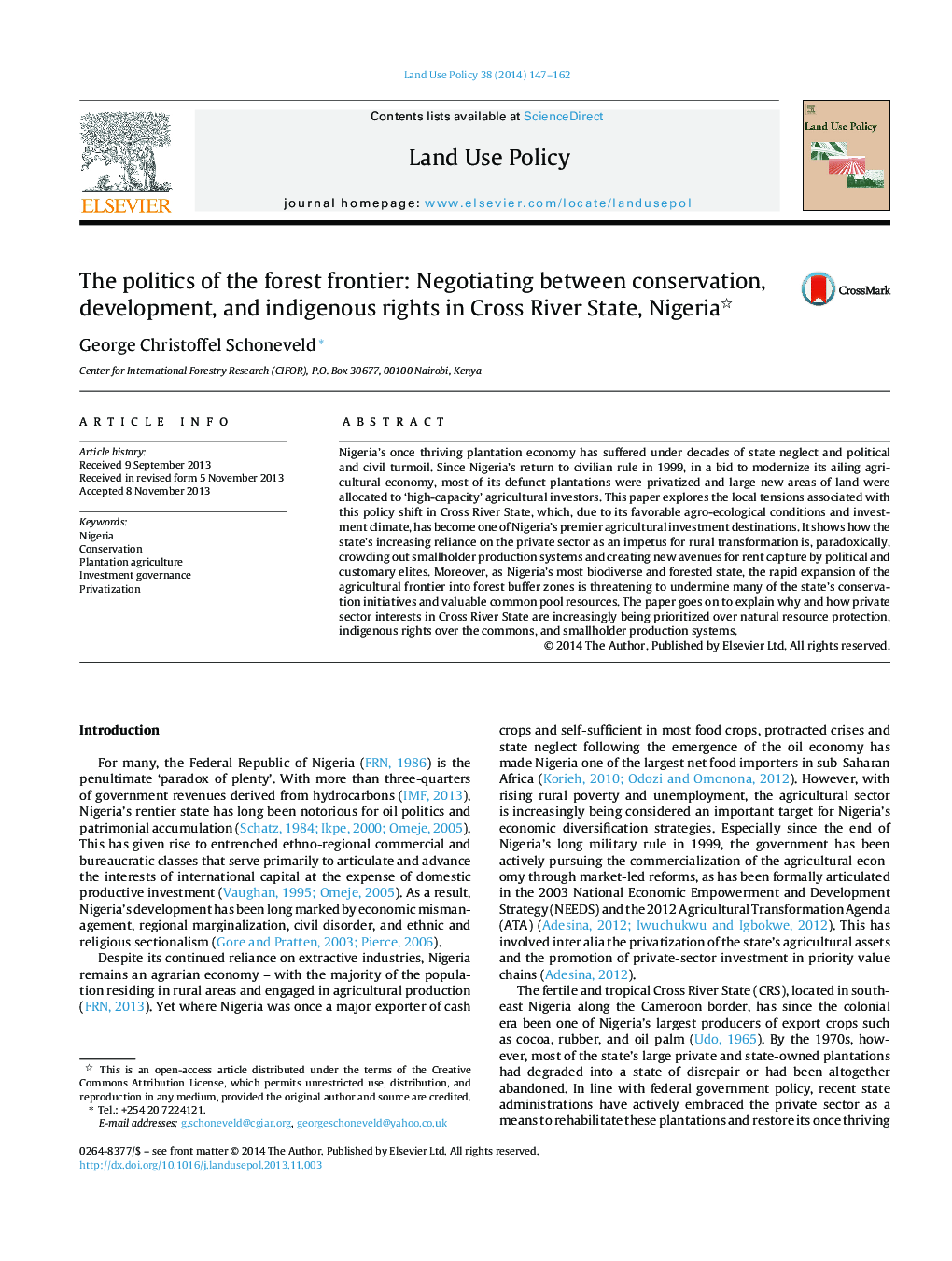| کد مقاله | کد نشریه | سال انتشار | مقاله انگلیسی | نسخه تمام متن |
|---|---|---|---|---|
| 6548738 | 160110 | 2014 | 16 صفحه PDF | دانلود رایگان |
عنوان انگلیسی مقاله ISI
The politics of the forest frontier: Negotiating between conservation, development, and indigenous rights in Cross River State, Nigeria
ترجمه فارسی عنوان
سیاست مرزی جنگل: مذاکره بین حفاظت، توسعه، و حقوق بومی در دولت رودخانه نیویورک
دانلود مقاله + سفارش ترجمه
دانلود مقاله ISI انگلیسی
رایگان برای ایرانیان
کلمات کلیدی
نیجریه، حفاظت، کشاورزی زراعتی، حکومتداری سرمایه گذاری، خصوصی سازی،
ترجمه چکیده
اقتصاد نیجریه ای که در حال رشد سریع است، طی دهه های بی توجهی دولت و آشفتگی های سیاسی و مدنی رنج می برد. از آنجا که بازگشت نیجریه به غیر نظامیان در سال 1999، به منظور اصلاح اقتصاد آنفولانزای خوکی، اکثر کاشت های منقرض شده آن خصوصیسازی شد و مناطق جدیدی از زمین به سرمایه گذاران کشاورزی با ظرفیت بالا اختصاص یافت. این مقاله کشف تنش های محلی در ارتباط با این تغییر سیاست در دولت رودخانه صلیب است که، با توجه به شرایط مناسب کشاورزی و محیط زیست و شرایط سرمایه گذاری، تبدیل شده است یکی از مهمترین مقصد سرمایه گذاری کشاورزی نیجریه است. این نشان می دهد که چطور وابستگی دولت به بخش خصوصی به عنوان یک انگیزه برای تحول روستایی، به طور متناقضی، از بین بردن سیستم های تولید کوچک و ایجاد راه های جدید برای جذب اجاره توسط نخبگان سیاسی و عادی است. علاوه بر این، به عنوان اکثر نابودگرایان و مزارع نیجریه، گسترش سریع مرز کشاورزی در مناطق بافر جنگل تهدید می کند که بسیاری از ابتکارات حفاظت از ایالت و منابع استخر مشترک با ارزش را تضعیف کنند. مقاله در ادامه به توضیح اینکه چرا و چگونه منافع بخش خصوصی در دولت رودخانه عبور است به طور فزاینده اولویت بندی بر حفاظت از منابع طبیعی، حقوق بومی بیش از مشترک، و سیستم های تولید کوچک.
موضوعات مرتبط
علوم زیستی و بیوفناوری
علوم کشاورزی و بیولوژیک
جنگلداری
چکیده انگلیسی
Nigeria's once thriving plantation economy has suffered under decades of state neglect and political and civil turmoil. Since Nigeria's return to civilian rule in 1999, in a bid to modernize its ailing agricultural economy, most of its defunct plantations were privatized and large new areas of land were allocated to 'high-capacity' agricultural investors. This paper explores the local tensions associated with this policy shift in Cross River State, which, due to its favorable agro-ecological conditions and investment climate, has become one of Nigeria's premier agricultural investment destinations. It shows how the state's increasing reliance on the private sector as an impetus for rural transformation is, paradoxically, crowding out smallholder production systems and creating new avenues for rent capture by political and customary elites. Moreover, as Nigeria's most biodiverse and forested state, the rapid expansion of the agricultural frontier into forest buffer zones is threatening to undermine many of the state's conservation initiatives and valuable common pool resources. The paper goes on to explain why and how private sector interests in Cross River State are increasingly being prioritized over natural resource protection, indigenous rights over the commons, and smallholder production systems.
ناشر
Database: Elsevier - ScienceDirect (ساینس دایرکت)
Journal: Land Use Policy - Volume 38, May 2014, Pages 147-162
Journal: Land Use Policy - Volume 38, May 2014, Pages 147-162
نویسندگان
George Christoffel Schoneveld,
